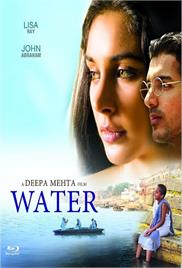Be Careful of Fake Websites. Always use HindiMovies.to domain & Join our Telegram Channel for Latest Updates.

Likes: 26
Views: 13.37K
A thesis picture. In 1938, Gandhi’s party is making inroads in women’s rights. Chuyia, a child already married but living with her parents, becomes a widow. By tradition, she is unceremoniously left at a bare and impoverished widows’ ashram, beside the Ganges during monsoon season. The ashram’s leader pimps out Kalyani, a young and beautiful widow, for household funds. Narayan, a follower of Gandhi, falls in love with her. Can she break with tradition and religious teaching to marry him? The ashram’s moral center is Shakuntala, deeply religious but conflicted about her fate. Can she protect Kalyani or Chuyia? Amid all this water, is rebirth possible or does tradition drown all?
Duration: 117 min
Released: 2005
IMDb Rating: 7.8/10 (11,191 Votes)
Genre: Drama, Hindi Movies, Romance
Stars: Buddhi Wickrama, Rinsly Weerarathne, Sarala Kariyawasam, Iranganie Serasinghe
Directors: Deepa Mehta
Writers: Deepa Mehta, Anurag Kashyap
Year: 2005
Server 1 – Estream
Server 2 – Vidto
Server 3 – Vidzi
Water (2005): A Profound Exploration of Social Injustice and Human Emotion
Overview:
Released in 2005, Water is an evocative drama that delves deep into the lives of widows in 1930s India—a time when widowed women were often ostracized and subjected to a life of austerity and servitude. The film presents a poignant tale that intertwines romance, social critique, and human resilience, encapsulated within a richly textured narrative.
Plot Summary:
Set against the backdrop of pre-independent India, Water centers on the story of Chuyia (played by Sarala Kariyawasam), an eight-year-old widow who is sent to an ashram—a place where widows live in seclusion as prescribed by orthodox societal norms. The ashram, a somber haven, houses women who have been shunned by society. Among them is Kalyani (Lisa Ray), a young widow who refuses to conform entirely to the oppressive traditions and yearns for freedom and love.
The narrative unfolds through Chuyia's innocent eyes and Kalyani's quiet resistance, revealing the harsh realities and limitations imposed on these women. The arrival of Narayan (John Abraham), a progressive and compassionate man, introduces a source of hope and change as he sympathizes with the widows’ plight. A tender romance between Kalyani and Narayan challenges the conservative societal fabric, creating tension and ultimately highlighting the strength it takes to rebel against entrenched injustice.
Main Cast and Characters:
Director and Writer:
Water was directed by Deepa Mehta, a renowned filmmaker acclaimed for her bold and insightful explorations of Indian society and culture. The film is the third installment in her Elements trilogy, following Fire and Earth. Deepa Mehta is also credited as the writer of the film, crafting a compelling screenplay that intertwines personal stories with incisive social commentary.
Production and Background:
Interestingly, Water faced significant challenges during its production. The original filming began in 1999 in India, but due to political and social protests, it was halted and subsequently restarted several years later in Sri Lanka with a new cast. This history testifies to the film's commitment to authenticity and the sensitive yet critical nature of its subject matter.
Thematic Elements and Impact:
Water is not just a period drama; it is a stirring critique of the patriarchal and caste-driven oppression that widows endured (and, in some contexts, continue to endure). The film beautifully balances its critical narrative with moments of compassion, hope, and human connection. Its portrayal of forbidden love serves as a metaphor for social change, courage, and the universal quest for dignity.
Music and Soundtrack:
Given that Water is a Hindi-language drama with strong cultural elements, music plays a key role in reinforcing the film’s emotional landscape. The soundtrack, composed by A. R. Rahman—one of India’s most celebrated music composers—blends traditional Indian musical motifs with evocative melodies that echo the film’s themes of sorrow, hope, and resistance. However, unlike mainstream Bollywood films, Water uses its songs sparingly and purposefully to enhance, rather than interrupt, the narrative flow.
Some notable songs include:
Critical Reception and Legacy:
Water earned widespread critical acclaim for its courageous storytelling and sensitive performances. It was nominated for the Academy Award for Best Foreign Language Film, bringing international attention to its shedding of light on a little-discussed subject. Critics praised Deepa Mehta's vision and the film's unflinching portrayal of social injustices, while the performances of Lisa Ray and Sarala Kariyawasam were particularly lauded.
Beyond awards, the film sparked conversations about gender, tradition, and human rights in India and globally. Its thematic relevance continues to resonate with audiences, making it a landmark work in Indian cinema and world cinema at large.
Conclusion:
Water (2005) stands as a profoundly moving portrayal of widowhood and societal oppression in India, driven by stellar performances from its main cast, visionary direction and writing by Deepa Mehta, and a sensitive musical score by A. R. Rahman. The film's compelling narrative and themes make it a must-watch for those interested in cinema that combines artistry with meaningful social commentary. Its courage in confronting difficult issues continues to inspire and provoke thought among viewers around the world.